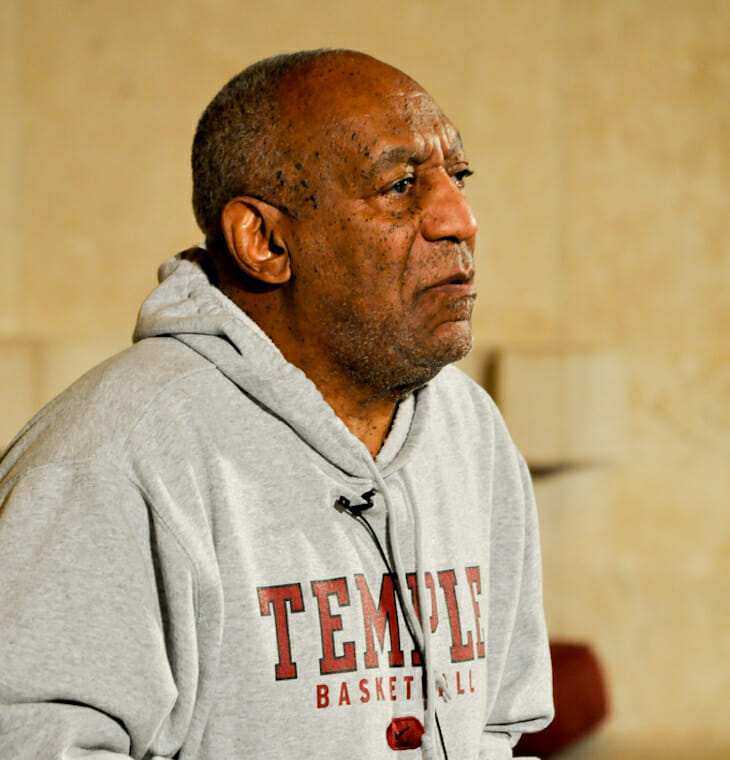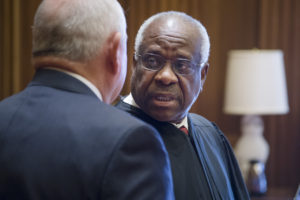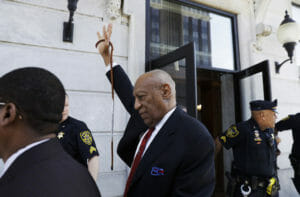Cosby Sentenced to Three to 10 Years for Sexual Assault
The disgraced comedian and television star will become the first major celebrity of the #MeToo era to serve prison time. Bill Cosby in 2011. (The World Affairs Council / Flickr)
Bill Cosby in 2011. (The World Affairs Council / Flickr)
His Hollywood career and good-guy image in ruins, an 81-year-old Bill Cosby was sentenced Tuesday to three to 10 years behind bars for drugging and sexually assaulting a woman, becoming the first celebrity of the #MeToo era to be sent to prison.
The punishment all but completed the dizzying, late-in-life fall for the comedian, former TV star and breaker of racial barriers.
“It is time for justice. Mr. Cosby, this has all circled back to you. The time has come,” Montgomery County Judge Steven O’Neill said. He quoted from victim Andrea Constand’s own statement to the court, in which she said Cosby took her “beautiful, young spirit and crushed it.”
Cosby declined the opportunity to address the court before the sentence came down.
The punishment came at the end of a two-day hearing at which the judge declared Cosby a “sexually violent predator” — a modern-day scarlet letter that subjects him to monthly counseling for the rest of his life and requires that neighbors and schools be notified of his whereabouts.
The comic once known as America’s Dad for his role on the top-rated “Cosby Show” in the 1980s was convicted in April of violating Constand, Temple University women’s basketball administrator, at his suburban Philadelphia estate in 2004. It was the first celebrity trial of the #MeToo era.
Cosby faced a sentence of anywhere from probation to 10 years in prison. His lawyers asked for house arrest, saying Cosby — who is legally blind — is too old and vulnerable to do time in prison. Prosecutors asked for five to 10 years behind bars, saying he could still pose a threat to women.
Montgomery County District Attorney Kevin Steele rejected the notion that Cosby’s age and infirmity entitle him to mercy. “He was good at hiding this for a long time. Good at suppressing this for a long time. So it’s taken a long time to get there,” Steele said.
The sentencing came as another extraordinary #MeToo drama unfolded on Capitol Hill, where Supreme Court nominee Brett Kavanaugh stands accused of sexual misconduct more than three decades ago.
The Cosby case “really raised awareness of the pervasiveness of … sexual misconduct against subordinates and against women of relatively less power,” said Daniel Filler, dean of Drexel University’s law school. “For jurors, I think it’s inherently changed the credibility of the accusers.”
In the years since Constand first went to authorities in 2005, more than 60 women have accused Cosby of sexual misconduct, though none of those claims have led to criminal charges.
The judge ruled on Cosby’s “sexually violent predator” status after a psychologist for the state testified that the entertainer appears to have a mental disorder that gives him an uncontrollable urge to have sex with women without their consent. When the ruling came down, a woman in the courtroom shot her fist into the air and whispered, “Yessss!”
In a statement submitted to the court and released Tuesday, Constand, now 45, that she has had to cope with years of anxiety and self-doubt. She said she now lives alone with her two dogs and has trouble trusting people.
“When the sexual assault happened, I was a young woman brimming with confidence and looking forward to a future bright with possibilities,” she wrote in her five-page statement. “Now, almost 15 years later, I’m a middle-aged woman who’s been stuck in a holding pattern for most of her adult life, unable to heal fully or to move forward.”
She also wrote of Cosby: “We may never know the full extent of his double life as a sexual predator, but his decades-long reign of terror as a serial rapist is over.”
The AP does not typically identify people who say they are victims of sexual assault unless they come forward publicly, which Constand and other accusers have done.
Constand went to police a year after waking up in a fog at Cosby’s gated estate, her clothes askew, only to have the district attorney pass on the case.
Another district attorney reopened the file a decade later and charged the TV star after stand-up comic Hannibal Buress’ riff about Cosby being a rapist prompted more accusers to come forward and after a federal judge, acting on a request from The Associated Press, unsealed some of Cosby’s startling, decade-old testimony in Constand’s related civil suit.
In his testimony, Cosby described sexual encounters with a string of actresses, models and other young women and talked about obtaining quaaludes to give to those he wanted to sleep with.
Cosby’s first trial in 2017 ended with a hung jury. He was convicted at a retrial that opened months after the #MeToo movement had taken down such figures as Hollywood studio boss Harvey Weinstein, NBC’s Matt Lauer, actor Kevin Spacey and Sen. Al Franken.
Constand said Cosby gave her what she thought were herbal pills to ease stress, then penetrated her with his fingers as she lay immobilized on a couch. Cosby claimed the encounter was consensual, and his lawyers branded her a “con artist” who framed the comedian to get a big payday — a $3.4 million settlement she received over a decade ago.
Five other accusers took the stand at the trial as part of an effort by prosecutors to portray him as a predator.
Cosby, whose estimated fortune once topped $400 million, broke barriers in the 1960s as the first black actor to star in a network show, “I Spy.” He went on to superstardom as wise and understanding Dr. Cliff Huxtable on “The Cosby Show,” a sitcom that showed America a new kind of black TV family: a warm and loving household led by two professionals, one a lawyer, the other a doctor.
He also found success with his Saturday morning cartoon “Fat Albert,” appeared in commercials for Jello-O pudding and became a public moralist, lecturing the black community about young people stealing things and wearing baggy pants. He won a Presidential Medal of Freedom and countless Emmys, Golden Globes and Grammy awards.
As the allegations mounted, his career all but collapsed, “Cosby Show” reruns were taken off the air, and one college after another stripped him of his honorary degrees.
Your support matters…Independent journalism is under threat and overshadowed by heavily funded mainstream media.
You can help level the playing field. Become a member.
Your tax-deductible contribution keeps us digging beneath the headlines to give you thought-provoking, investigative reporting and analysis that unearths what's really happening- without compromise.
Give today to support our courageous, independent journalists.




You need to be a supporter to comment.
There are currently no responses to this article.
Be the first to respond.